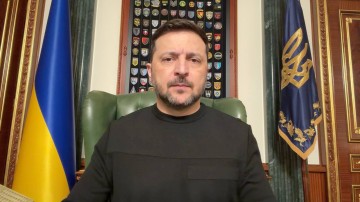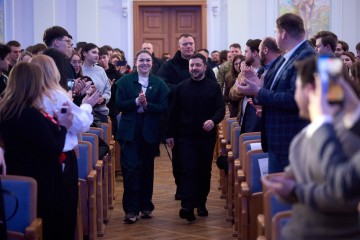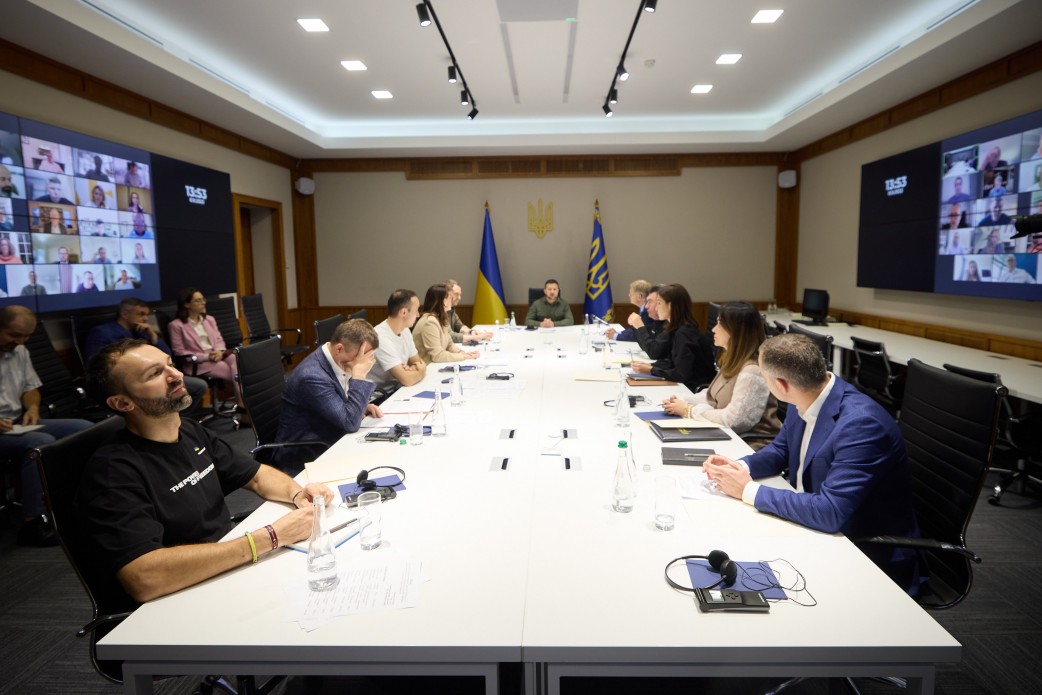President of Ukraine Volodymyr Zelenskyy held a meeting with Director at the Freeman-Spogli Institute for International Studies (FSI), Ambassador Michael McFaul, who, along with Head of the Office of the President Andriy Yermak, leads the International Expert Group on Russian Sanctions.
Head of the Office of the President Andriy Yermak, Secretary of the National Security and Defense Council Oleksiy Danilov, First Deputy Prime Minister, Minister of Economy Yulia Svyrydenko, Deputy Head of the Office of the President Rostyslav Shurma, Deputy Minister of Justice Iryna Mudra, President of Kyiv School of Economics Tymofiy Mylovanov, advisors to the head of the Office of the President Daria Zarivna, Vladyslav Vlasiuk and Serhiy Leshchenko attended the meeting.
Experts of the International Group joined the meeting via video links.
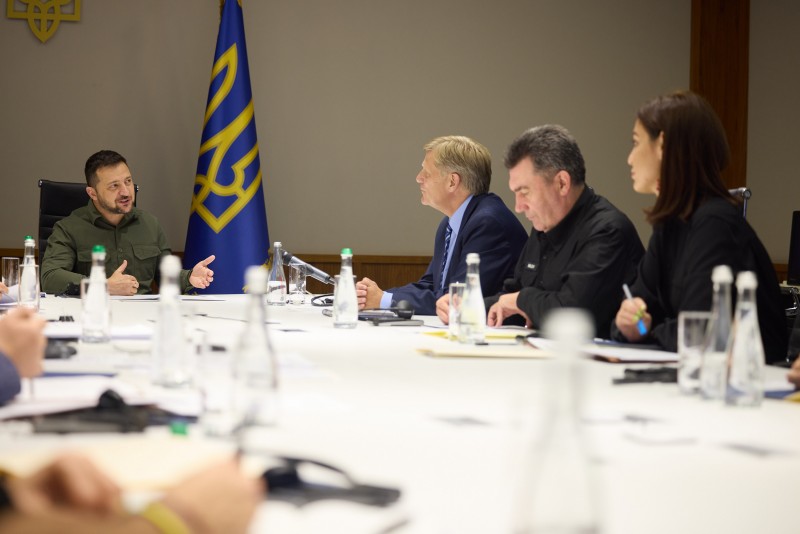 The Head of State thanked Michael McFaul and the entire team of the Group, which shows true achievements in the field of sanctions policy against the aggressor country.
The Head of State thanked Michael McFaul and the entire team of the Group, which shows true achievements in the field of sanctions policy against the aggressor country.
"The result is 15 important documents developed by the International Expert Group. I want to thank all our partners who use these developments because it is very important. During meetings, partners around the world say that they are doing everything possible to introduce new sanctions against Russia that you proposed," Zelenskyy said.
The President noted the importance of systematic work with partner countries to implement the achievements of the International Expert Group.
The Head of State emphasized the strengthening of sanctions against Russia's energy sector, and the inadmissibility of supplying the aggressor country with components and spare parts used for manufacturing missiles and drones. The President said that Russia is directing these weapons, in particular, against the facilities of Ukraine's energy infrastructure, and therefore, this issue is of particular importance on the eve of the autumn-winter period. In addition, it is crucial to strengthen sanctions against Russia's financial and banking sectors.
Zelenskyy called on the International Expert Group to continue its activities to enhance sanctions pressure on Russia in various areas, together with foreign partners.
For his part, Michael McFaul noted the importance of depriving the Russian regime of funds that are used for waging the aggressive war against Ukraine. In particular, he stressed that Russia's frozen assets should never be returned to the aggressor state but should be directed toward Ukraine's recovery. The ambassador emphasized that every Russian company and individual operating in the aggressor country should feel the consequences of the imposed sanctions.
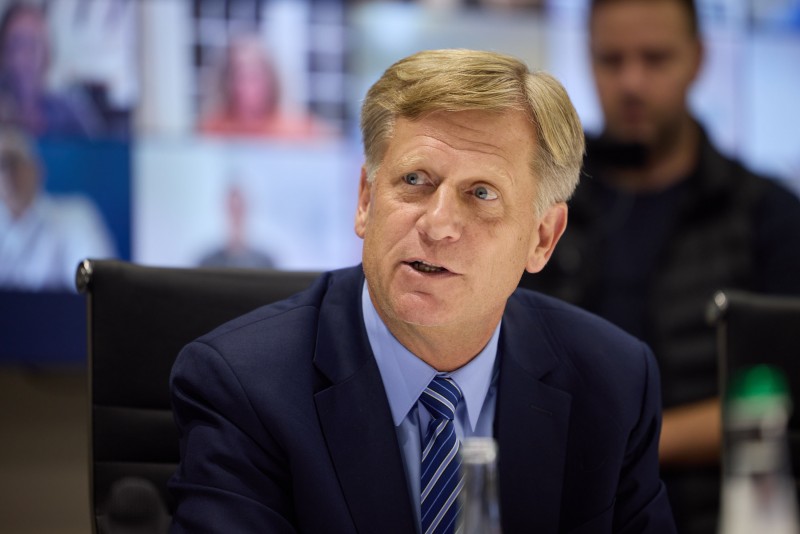 "We have certain results we managed to achieve. But we have to continue our work," Michael McFaul said.
"We have certain results we managed to achieve. But we have to continue our work," Michael McFaul said.
Head of the President's Office Andriy Yermak said that the International Expert Group has become a generator and a key platform for preparing sanctions against Russia.
He said that thanks to the group's efforts, an embargo on crude oil and petroleum products and a mechanism for oil price caps have been introduced, and over $300 billion of the Russian Central Bank's assets have been immobilized, also sanctions against Russian propagandists have been introduced, and the activities of Russian-language mass media in several EU countries have been banned. According to Yermak, the International Expert Group is currently working on such important areas as the introduction of sanctions against Rosatom, software restrictions, further energy sanctions, as well as effective limitations to halt the flow of microelectronics into Russia.
"Therefore, we are rapidly responding to the calls of our military to counter the Russian defense industry's growing manufacturing of drones and missiles. Overall, this set of measures is aimed at further restricting the aggressor country's access to technology," the head of the President's Office said.
Secretary of the National Security and Defense Council Oleksiy Danilov said that since the beginning of Russia's full-scale aggression, the NSDC has imposed sanctions against 7,010 individuals and 5,028 legal entities, including representatives of Russia and other states working with the aggressor country. In addition, Changes to the sanctions legislation have been adopted, introducing electronic sanctions records.
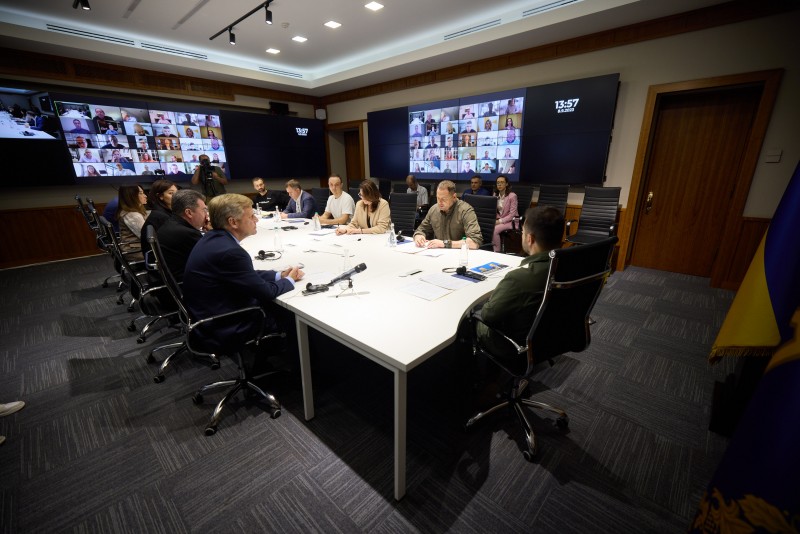 First Deputy Prime Minister, Minister of Economy Yulia Svyrydenko emphasized the importance of strengthening export control of goods supplied to Russia and preventing the aggressor country's access to high-tech components.
First Deputy Prime Minister, Minister of Economy Yulia Svyrydenko emphasized the importance of strengthening export control of goods supplied to Russia and preventing the aggressor country's access to high-tech components.
Advisors to the head of the Office of the President Daria Zarivna and Vladyslav Vlasiuk informed about how the international sanctions group created a system of development, advocacy, and implementation of international sanctions. From the beginning, the idea was to turn the group into a kind of complex media, in addition to the analytical component, where each expert is also a separate channel of customized communication. As a result, in addition to the group's analytical products, an ecosystem was created for their discussion and popularization at the levels of governments, expert communities, and wider audiences in different countries. This made it possible to improve the process of taking into account the proposals of the Yermak-McFaul international group by the governments of the partner states.
At the end of the meeting, the Head of State presented Michael McFaul with the Order of Merit, 3rd class, recognizing his significant personal contributions to strengthening interstate cooperation, supporting Ukraine's state sovereignty and territorial integrity, and his substantial efforts in promoting Ukraine on the world stage.


